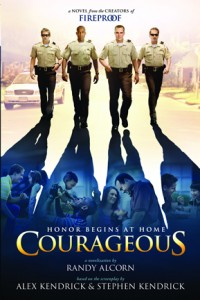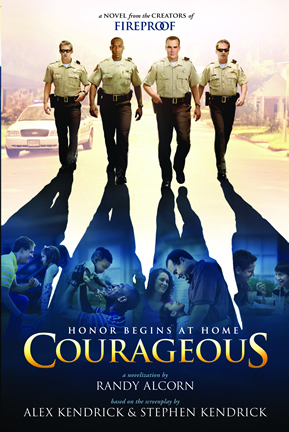Christian Filmmakers Choose New Direction
 Yesterday Alex and Stephen Kendrick (Facing the Giants, Fireproof, Courageous) announced a change in their filmmaking aspirations.
Yesterday Alex and Stephen Kendrick (Facing the Giants, Fireproof, Courageous) announced a change in their filmmaking aspirations.
After years of prayer, and with the support and blessing of their pastor, Alex and Stephen are expanding their movie making endeavors beyond Sherwood Baptist Church’s walls.
Kendrick Brothers Productions will be launching an independent movie production company designed to partner with believers across the nation and help train the next generation of Christian filmmakers. The Kendrick brothers plan to make their next movie under this new paradigm.
So the Kendricks are still Sherwood members for sure — it’s their company they’ll take outside Georgia church’s purview.
Naturally I commented further on my social-network page:
Intriguing. However: until these well-meaning filmmakers recognize that the purpose of story must go beyond moral edification, entertainment, and especially evangelism, and until they recognize that great movies should not resemble church services (any more than church services should resemble movies), their God-glorifying work will continue to be limited.
[…] Mind you, I believe a great story should morally edify, entertain, and to some extent evangelize. But when Christian storytellers determine that this can only mean certain things — e.g. believing that “evangelism” must mean “include an overt John 3:16 presentation or bust” — then they are limiting the story and themselves.
God as our Creator and Author doesn’t have this limit. Neither should Christian storytellers.
What do you think of this Kendrick movie-making change? Supportive? Critical? Mixed?





































Just like Christian novelists have adapted and improved through their ongoing dialog about craft and the meaning of art and story from a Christian perspective, so Christian filmmakers must create and discuss and adapt. The only negative possibility I can think of is if no one else rises to the challenge. The Kendricks can’t get there on their own; there has to be other voices, some of which may and should challenge the Kendricks’ conventions.
I wish they would make a space opera web-streamed “TV” show, though. 😉
The problem with YouTube “TV” shows is that there’s no money in ’em. And space operas require plenty of money in order to look halfway decent.
I think there is a lot of potential future in youTube series. Even Warner Bros is getting into it with H+. Sci-fi is all but dead on traditional TV. With advertising revenue from youTube, and kickstarter campaigns to get initial funding, I think that independant shows on youTube may just be the future of space opera. I think flm-makers are quickly learning to do things cheaper. An episode of the recent Battlestar Galactica was much cheaper to produce than an episode of Star Trek DS9 back in the nineties. It may mean that the types of stories told will change, be less flashy. Fan productions like Star Trek Phase II have pretty much reached professional standards.
Anyway, I’d love to see a Christian space opera show!
I must admit, I’ve been amused by some of the support for the Courageous guys and resulting requests that go something like this: “Oh, they should be the ones doing the next Narnia movies, instead of dumb ol’ Disney or dumb ol’ Fox.”
Disney may have dropped the franchise, and Fox wrecked The Voyage of the Dawn Treader, but their production values and experience with fantasy is still worlds away from folks who make what are basically Hallmark-level contemporary films with little to no sets, volunteer actors, and the same environment (Albany, Georgia).
I don’t usually know about filmmaking. But when I do, I know that you can’t jump immediately from all-contemporary made-for-TV-style movies to multimillion-dollar fantasy blockbusters without first having years of experience.
Of course, it also helps to believe Christians should be making these different kinds of movies anyway. Contemporary morality-fable films have their place, and I shall not diss them or their makers. However, their subjects (not to mention budgets) are limited — limited more than the variety of stories and themes our Author has told.
You don’t have any hope for Christians to eventually create art for the highest levels of popular entertainment, then?
Hollywood has some preconceived notions that really limit their potential to tell stories effectively. Like, the easiest way to show that two people are in love is a sex scene. Christians could, perhaps, bring some fresh approaches to the table. The Evangelical clichés certainly present artistic problems, too, and I think Christian creators should work diligently at either eliminating or reviving those clichés, which is exactly what I think the Speculative Faith team has been doing here. But there are secular clichés too, and mainstream culture and storytelling are the worse for them. Christian creators free from the Evangelical limitations and stereotypes could present a better artistic vision in mainstream entertainment, if they ever make it there.
Actually those Fireproof guys have more freedom staying outside of Hollywood. The problem is that the amount of money it takes to make a A class film, or even a B class one, prevents any real artistic vision. Why do we have five Resident Evil movies, or three absolutely horrible Transformer ones? People with money back proven and conservative projects over artistic ones.
Though to be honest, the Kendrick brothers aren’t blazing any trails either. They are replicating Tyler Perry more than anything, and we have a modern “chit’lin circuit” of Christian films that make money targeting specific demographics. The sheer cost of making films tends to make it an intensely conservative form of media, and real change comes rarely, and completely outside of Hollywood, like in foreign cinema.
I do have this hope — though my pessimistic side anticipates only getting ahold of, say, those very cool studios after the great fire and the New Earth arrives. 😀
They are. And yes, Christians should spend less time acting or responding with That’s outrageous! Let’s get ’em, and instead rolling their eyes (winsomely, Christlike) and saying, Hollywood, that’s lame. You can do better. Here’s why.
Oh, and we could also say, backed with action, We’ll show you how.
And I don’t mean to practice a “blame the Church first” ethic here. There are plenty of reasons why Christians now can’t get into The System because the rules of the game are rigged. (See also: politics, science, etc.) No matter who we blame for the rigging, though, Christians can deal with their inconsistent views of vocation and creativity while they’re trying to claw their ways into Systems.
But of course, that’s only my limited view as a Speculative Faith co-editor and webslinger — though a very encouraged one, thanks to your above comment. 🙂
Christian filmmakers are fully capable of creating cinematic stories that are gorgeous, exciting, and profound. (Exhibit A: http://www.youtube.com/watch?v=imeFWE4rHRg) What often seems to hold them back isn’t a lack of funding or a lack of acceptance by the Evil Hollywood Establishment, but a lack of artistic rigor unworthy of those who pledge allegiance to the Creator of the physical and spiritual universe. Only those faithful to make the most of the little with which they’ve been entrusted should expect to be presented with the funding necessary to produce that epic high fantasy of which they’ve always dreamt. Power and prestige don’t arrive overnight; they come as a result of creative intuition, technical prowess, and decades of hard work. If we Christians would only take art seriously, we might not have to wait for the arrival of New Earth to make lots of awesome movies.
Will this move improve their storytelling skillz? It’s possible, I suppose, but unlikely.
Storytelling is storytelling, regardless of whether it’s sponsored by a church or a production studio. If the Kendricks’ grasp of the art of filmmaking was so weak when their crew consisted of their congregation that they felt comfortable climaxing their script with an on-screen altar call, nothing will change now that they’re branching out on their own.
I think it’s a good thing. An independent movie studio is a step in the right direction.
What I am truly encouraged by is this: “Kendrick Brothers Productions will be launching an independent movie production company designed to partner with believers across the nation and help train the next generation of Christian filmmakers.”
I remember when they wouldn’t even take volunteers who did not attend the church. They owed their existence to the church’s support, so I suppose I could see their point. But it also seemed, to me, to reflect the sad fact that too often, Christian artists have a distinct lack of interest in helping those who are, in so many ways, our fellow-travelers. Sometimes it feels like we take note of our common faith principally to criticize each other’s expressions of it.